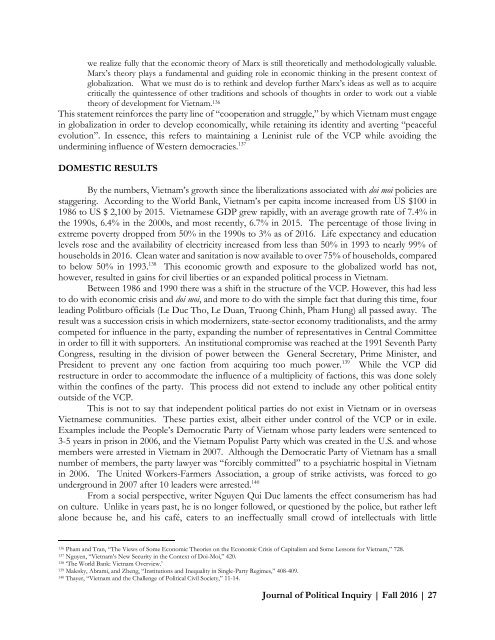Fall2016_Final2
You also want an ePaper? Increase the reach of your titles
YUMPU automatically turns print PDFs into web optimized ePapers that Google loves.
we realize fully that the economic theory of Marx is still theoretically and methodologically valuable.<br />
Marx’s theory plays a fundamental and guiding role in economic thinking in the present context of<br />
globalization. What we must do is to rethink and develop further Marx’s ideas as well as to acquire<br />
critically the quintessence of other traditions and schools of thoughts in order to work out a viable<br />
theory of development for Vietnam. 136<br />
This statement reinforces the party line of “cooperation and struggle,” by which Vietnam must engage<br />
in globalization in order to develop economically, while retaining its identity and averting “peaceful<br />
evolution”. In essence, this refers to maintaining a Leninist rule of the VCP while avoiding the<br />
undermining influence of Western democracies. 137<br />
DOMESTIC RESULTS<br />
By the numbers, Vietnam’s growth since the liberalizations associated with doi moi policies are<br />
staggering. According to the World Bank, Vietnam’s per capita income increased from US $100 in<br />
1986 to US $ 2,100 by 2015. Vietnamese GDP grew rapidly, with an average growth rate of 7.4% in<br />
the 1990s, 6.4% in the 2000s, and most recently, 6.7% in 2015. The percentage of those living in<br />
extreme poverty dropped from 50% in the 1990s to 3% as of 2016. Life expectancy and education<br />
levels rose and the availability of electricity increased from less than 50% in 1993 to nearly 99% of<br />
households in 2016. Clean water and sanitation is now available to over 75% of households, compared<br />
to below 50% in 1993. 138 This economic growth and exposure to the globalized world has not,<br />
however, resulted in gains for civil liberties or an expanded political process in Vietnam.<br />
Between 1986 and 1990 there was a shift in the structure of the VCP. However, this had less<br />
to do with economic crisis and doi moi, and more to do with the simple fact that during this time, four<br />
leading Politburo officials (Le Duc Tho, Le Duan, Truong Chinh, Pham Hung) all passed away. The<br />
result was a succession crisis in which modernizers, state-sector economy traditionalists, and the army<br />
competed for influence in the party, expanding the number of representatives in Central Committee<br />
in order to fill it with supporters. An institutional compromise was reached at the 1991 Seventh Party<br />
Congress, resulting in the division of power between the General Secretary, Prime Minister, and<br />
President to prevent any one faction from acquiring too much power. 139 While the VCP did<br />
restructure in order to accommodate the influence of a multiplicity of factions, this was done solely<br />
within the confines of the party. This process did not extend to include any other political entity<br />
outside of the VCP.<br />
This is not to say that independent political parties do not exist in Vietnam or in overseas<br />
Vietnamese communities. These parties exist, albeit either under control of the VCP or in exile.<br />
Examples include the People’s Democratic Party of Vietnam whose party leaders were sentenced to<br />
3-5 years in prison in 2006, and the Vietnam Populist Party which was created in the U.S. and whose<br />
members were arrested in Vietnam in 2007. Although the Democratic Party of Vietnam has a small<br />
number of members, the party lawyer was “forcibly committed” to a psychiatric hospital in Vietnam<br />
in 2006. The United Workers-Farmers Association, a group of strike activists, was forced to go<br />
underground in 2007 after 10 leaders were arrested. 140<br />
From a social perspective, writer Nguyen Qui Duc laments the effect consumerism has had<br />
on culture. Unlike in years past, he is no longer followed, or questioned by the police, but rather left<br />
alone because he, and his café, caters to an ineffectually small crowd of intellectuals with little<br />
136<br />
Pham and Tran, “The Views of Some Economic Theories on the Economic Crisis of Capitalism and Some Lessons for Vietnam,” 728.<br />
137<br />
Nguyen, “Vietnam’s New Security in the Context of Doi-Moi,” 420.<br />
138<br />
‘The World Bank: Vietnam Overview.’<br />
139<br />
Malesky, Abrami, and Zheng, “Institutions and Inequality in Single-Party Regimes,” 408-409.<br />
140<br />
Thayer, “Vietnam and the Challenge of Political Civil Society,” 11-14.<br />
Journal of Political Inquiry | Fall 2016 | 27
















